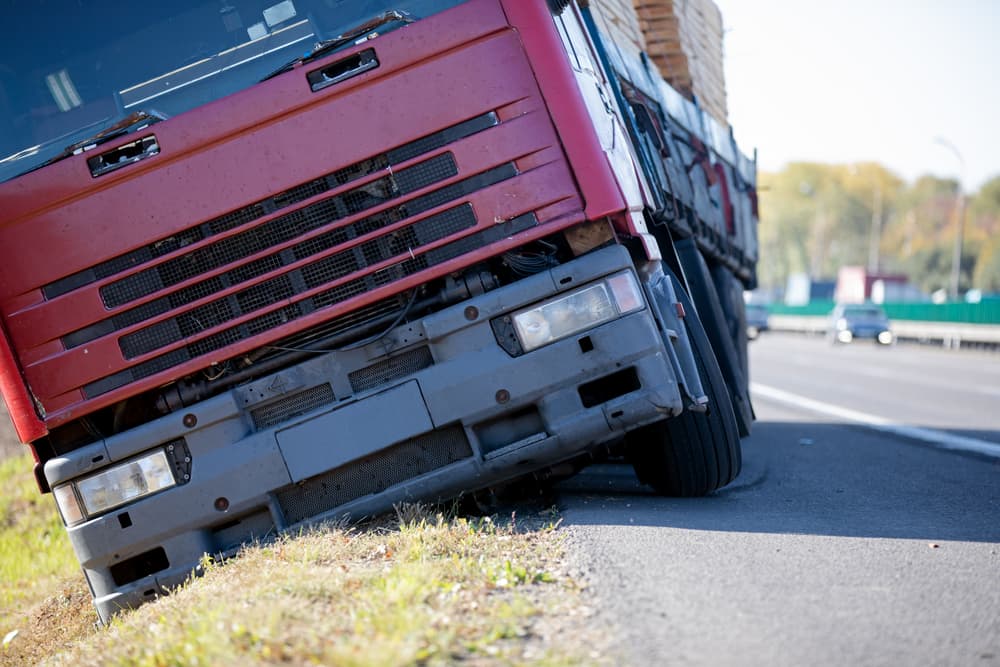When truck drivers or trucking companies behave negligently, such as by speeding around sharp curves or failing to load trucks properly, jackknife accidents can occur. When a large truck jackknifes, it may strike numerous vehicles in its path, causing the occupants to suffer debilitating injuries.
If you or someone you love suffered injuries in a recent truck jackknife accident, you want an experienced attorney on your side advocating for you every step of the way. A knowledgeable truck accident lawyer can identify all potentially responsible parties and take the necessary steps to pursue the compensation you deserve for your injuries.
How do Truck Jackknife Accidents Occur?
Jackknife accidents involving trucks are often catastrophic, and they can result from various forms of negligence on the part of truck drivers or trucking companies. These accidents happen when the trailer of a truck swings out to the side, forming an acute angle with the cab, resembling the folding of a jackknife.

- One common cause of jackknife accidents is speeding. When truck drivers exceed the speed limit, especially on curves or slippery roads, they increase their chances of losing control of the vehicle. The momentum generated by the speed may cause the trailer to swing out of alignment with the cab, causing a jackknife.
- Another factor is improper braking techniques. Truck drivers are trained to use proper braking procedures, including avoiding sudden or hard braking. However, if a driver fails to brake properly, it can cause the truck’s wheels to lock up, leading to a loss of traction and control. This may result in the trailer swinging around and causing a jackknife.
- Neglecting to properly maintain the truck and its components is also a significant contributor to jackknife accidents. Faulty brakes, worn tires, and other mechanical issues increase the likelihood of a loss of control – especially during emergency maneuvers. Trucking companies have a responsibility to ensure that their vehicles are properly maintained and undergo regular inspections to prevent such accidents.
- Driver fatigue is another prevalent issue in the trucking industry. Long hours on the road without adequate rest can affect a driver’s judgment and reaction time, increasing the risk of accidents. Fatigued drivers are less able to respond effectively to changing road conditions or unexpected events, making them more susceptible to jackknife accidents.
- Furthermore, inexperienced or poorly trained drivers may lack the skills necessary to safely operate a commercial truck. Maneuvering a large vehicle requires specialized training and expertise, and inexperienced drivers may struggle to control the truck in challenging situations, such as adverse weather or heavy traffic.
- Lastly, improper loading and distribution of cargo can also contribute to jackknife accidents. If the cargo is not properly secured or distributed within the trailer, it can shift during transit, causing the trailer to become unbalanced and prone to swinging out of control.
Common Injuries in a Truck Jackknife Accident
Victims of truck jackknife accidents can suffer from a range of physical and mental injuries, often requiring extensive medical care to recover. Among the most common physical injuries are traumatic brain injuries (TBIs), spinal cord injuries, broken bones, and internal organ damage.
- TBIs occur when the head experiences a sudden impact or jolt, causing damage to the brain. Symptoms can vary from concussions to more severe cognitive impairments, depending upon the severity of the injury. Victims may experience headaches, dizziness, memory loss, and difficulty concentrating. Treatment for TBIs often involves rest, medication, and rehabilitation therapy to regain lost cognitive functions.
- Spinal cord injuries can result in partial or complete paralysis, depending on the location and severity of the injury. Victims may lose sensation and motor function below the site of the injury, leading to lifelong disabilities. Treatment may include surgery, medication, and physical therapy to improve mobility and function.
- Broken bones are another common injury in truck jackknife accidents, often resulting from the force of the impact or from being crushed by the vehicle. Fractures can occur in the arms, pelvis, ribs, and legs, requiring immobilization with casts or braces and, in severe cases, surgical intervention to realign the bones.
- Internal organ damage can occur due to blunt force trauma or from being pierced by broken bones or debris. Injuries to organs such as the lungs, liver, spleen, and kidneys can be life-threatening and may require emergency surgery to repair or remove damaged tissue.
- In addition to physical injuries, victims of truck jackknife accidents may suffer from mental health issues such as post-traumatic stress disorder (PTSD), depression, and anxiety. Witnessing or experiencing a traumatic event – including a truck accident – can have long-lasting psychological effects, interfering with daily functioning and quality of life. Therapy and medication may be necessary to address these mental health issues and help victims cope with their experiences.
Overall, the medical care required for victims of truck jackknife accidents can be extensive and costly. In addition to emergency treatment for immediate injuries, ongoing care may be necessary to address long-term physical and mental health issues. Rehabilitation therapy, assistive devices, and home modifications may also be necessary to support victims in their recovery and help them regain independence and quality of life.
How to Prove Negligence in a Truck Jackknife Accident Case
In a truck jackknife accident case, several legal elements of proof must be established to prove liability and damages. These elements typically include duty, breach of duty, causation, and damages.

- First, duty refers to the legal obligation of the truck driver and/or trucking company to operate the vehicle safely and in accordance with traffic laws and regulations. This duty extends to other motorists and pedestrians sharing the road.
- The next element is a breach of duty, which involves demonstrating that the truck driver or trucking company failed to fulfill their duty of care. This can involve actions such as speeding, reckless driving, improper maintenance of the vehicle, or violations of federal regulations governing the trucking industry.
- Causation is another critical element, requiring proof that the breach of duty directly caused or contributed to the accident. This often involves establishing a causal link between the negligent actions of the truck driver or company and the resulting jackknife accident.
- Finally, damages refer to the injuries and losses that the victim suffered as a direct result of the truck jackknife accident. These can include physical injuries, medical expenses, lost income, property damage, pain and suffering, and emotional anguish.
To prove liability in a truck jackknife accident case, various types of evidence may be necessary. This can include eyewitness testimony from individuals who observed the accident, expert testimony from accident reconstruction specialists or medical professionals, and various types of documentation, including police reports, photographs of the scene, and maintenance records for the truck involved.
Additionally, electronic data from the truck’s black box or electronic logging device (ELD) may provide valuable information about the vehicle’s speed, braking patterns, and other relevant factors leading up to the accident.
To establish damages, the victim may need to provide medical records detailing their injuries and treatment, as well as documentation of any other losses suffered as a result of the accident, such as lost income or property damage estimates.
Successfully proving negligence in a truck jackknife accident case requires careful gathering and presentation of evidence. A knowledgeable truck accident lawyer can obtain the evidence necessary for your case and work to pursue a successful outcome.
When is it Necessary to Litigate a Truck Accident Claim?
Litigation in a truck jackknife accident case becomes necessary when the parties involved cannot reach a settlement through negotiation or alternative dispute resolution (ADR) methods such as mediation or arbitration. Several factors may lead to the need for litigation in these cases.
First, if there is a dispute over liability (or fault), with each party blaming the other for the accident, litigation may be necessary to resolve the matter through the court system. This often occurs when the evidence is conflicting or when one party refuses to accept responsibility for the accident.

Secondly, if there is a disagreement over the extent of damages that the victim suffered, litigation may be necessary to determine the appropriate compensation amount. Insurance companies may dispute the severity of the victim’s injuries or the amount of financial losses that the victim endured, necessitating a legal battle to establish the true extent of harm suffered.
Additionally, if the parties involved are unable to agree on a fair settlement amount, litigation may be the only way to pursue compensation for the victim’s injuries and losses. This can occur when insurance companies refuse to offer adequate compensation or when there are multiple parties involved, each with their own insurance coverage and interests to protect.
Moreover, if there are legal complexities or issues that cannot be resolved through negotiation, such as disputes over jurisdiction or interpretation of state or federal laws governing trucking accidents, litigation may be necessary to seek clarity and resolution from the courts.
If there is evidence of gross negligence or wrongdoing on the part of the truck driver or trucking company, such as intentional misconduct or violations of safety regulations, litigation may be the appropriate course of action to hold the responsible parties accountable for their actions.
An experienced truck accident lawyer can handle every step of the litigation process for you and aggressively represent you during all litigation proceedings in your case.
Factors that Affect a Truck Accident Claim’s Value
Several factors can influence the value of a truck jackknife accident case, affecting the compensation that victims may recover. These factors include the severity of injuries, the extent of property damage, liability issues, and the availability of insurance coverage.
- First, the severity of the victim’s injuries is a significant factor in determining the value of the case. More severe injuries, such as traumatic brain injuries, spinal cord injuries, or permanent disabilities, typically result in higher compensation awards. This compensation may cover medical expenses, lost income, and pain and suffering that the victim endured.
- The extent of property damage is also crucial in evaluating the case’s value. If the victim’s vehicle sustains significant damage or is totaled in the accident, they may be entitled to compensation for repair or replacement costs. Additionally, compensation may cover any other property damage incurred as a result of the accident, such as damage to personal belongings or other vehicles involved.
- Liability issues can play a significant role in determining compensation. If the truck driver or trucking company is found to be fully or partially at fault for the accident due to negligence or misconduct, they may be held liable for damages. However, if there are disputes over liability or multiple parties involved, it can complicate the case and affect the final compensation amount.
- Moreover, the availability of insurance coverage can affect the compensation that victims may recover. If the at-fault party has sufficient insurance coverage to fully compensate the victim for their injuries and losses, it may result in a higher settlement or judgment amount. However, if the insurance coverage is insufficient, victims may receive less compensation than they deserve.
Types of compensation that victims may recover in a truck jackknife accident case include economic damages and non-economic damages. Economic damages cover tangible financial losses, such as medical bills, lost income, and property damage. Non-economic damages, on the other hand, compensate for intangible losses, such as pain and suffering, emotional distress, and loss of life enjoyment.
The ultimate value of a truck jackknife accident case depends upon various factors, including the severity of injuries, property damage, liability issues, and insurance coverage. By considering these factors, a truck accident lawyer can estimate the likely settlement or verdict value of your case and work to maximize your final compensation award.
Talk with a Truck Accident Attorney Near You Today
If you suffered injuries in a recent truck accident, you want a lawyer on your side who will aggressively fight for your interests. An experienced personal injury attorney can file a timely claim or lawsuit on your behalf, negotiate with the insurance company, and if necessary, litigate your case to a resolution in the court system.
